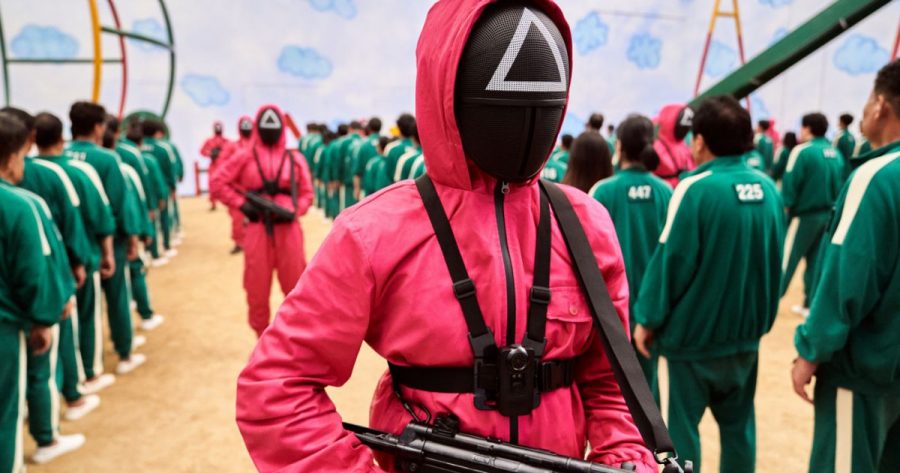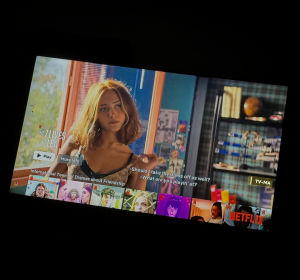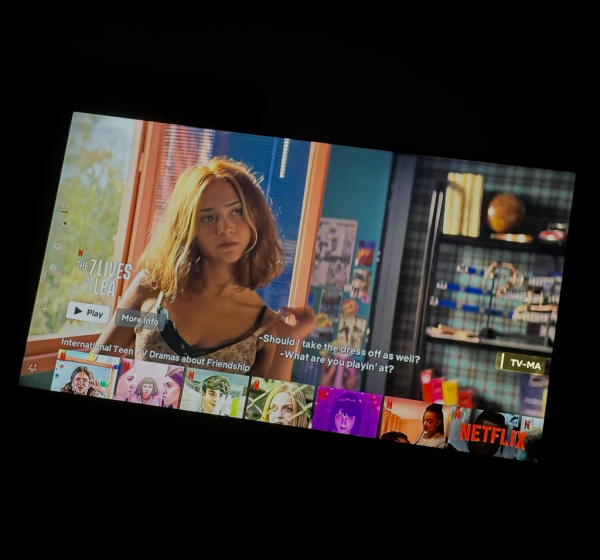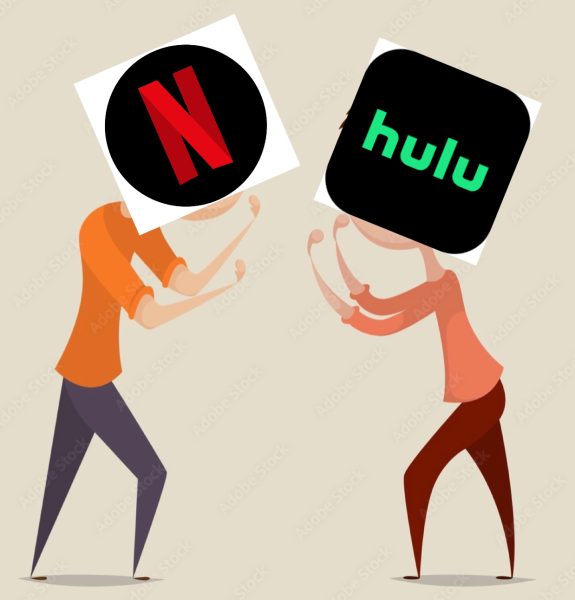Squid Game: Multi-Cultural Impact and Two Points of View
Scene from Netflix show “Squid Game” as participants and guards prepare for the beginning of a new dangerous game
October 21, 2021
Whether it was through the countless Tik Toks of a robot little girl singing “Red Light, Green Light ,” or the recreation of honeycomb cookies, you’ve probably heard about today’s new bloodsport Netflix phenomena: Squid Game. Living in a blood-thirsty world where people will pay all kinds of money for enjoyment based on other’s suffering, Squid Game became a dystopian nightmare for all viewers, critiquing gender roles, the economy, and society itself.
This nine-episode thriller-drama follows the life of Seong Gi-hun, played by Lee Jung-Jae, a divorced man with a gambling problem in crippling debt who may be about to lose the relationship with his only daughter if he can’t get his life together. He finds himself invited by a man in a suit to play a few simple games for tons of money. Although skeptical, he doesn’t see any other option other than to accept. In a remote location, 456 players in financial debt including Seong Gi-Hun soon realize there’s an ominous evil lurking behind it all as they play various Korean childhood games with a lot more at stake than just losing. The winner is promised to receive a prize of ₩45.6 billion ($38 million), but the nail-biting question throughout the whole show is who will be the last one standing with the blood of the other 455 players on their hands.

Antonella’s viewpoint: The Psychology Behind Squid Game
In the film, human life is viewed as a board game, a game of chance. Squid Game rapidly became the first Korean drama to be number one on Netflix, barely four days after its release.
The series, much like the Oscar-winning Korean movie Parasite, has an ongoing theme of “Eat the rich.” It highlights poverty and the lengths human beings will go to for power or class. With the economy rapidly declining all over the world, people become more desperate every day to make money appear, make ends meet, and feed their kids.
“People are attracted by the irony that hopeless grownups risk their lives to win a kids’ game,” Squid Game director Hwang Dong-hyuk said in an interview.
There’s also the element of nostalgia involved. For example, the Dalgona honeycomb challenge featured in episode three, where honeycombs need to be cracked into figures without breaking into the shape, is one that most Koreans remember playing when they were young. The Dalgona game has kickstarted a trend on multiple social media platforms for kids in America and all over the world to participate.
The show brings people from all kinds of backgrounds, religions, and back-stories. For example, the lead struggles to gain respect from his family. Throughout the game, he meets a young woman with a tragic background, an old friend who will stop at nothing to repay his mistakes, an old man with no visible advantage, and a Pakistani laborer who is mistreated by his employers. The appearances like color, gender, or the age of the participants meant a lot within the game, bringing people to make life-threatening decisions based on who should be considered allies or enemies as well as who deserves what kind of treatment during the game. Many friendships came in and not many came out. As one gaming official says in the series: “All participants in the game are equal. We are giving people who have suffered unequal treatment and discrimination in the outside world the last chance to win a fair competition.”
The gruesome thriller expands a window into how society treats others to succeed and how we do not fear stepping on others and pushing them down to get to the top.

Melanie’s viewpoint: Why and How did “Squid Game” become Netflix’s Biggest Show Yet?
As an avid fan of K-dramas myself, it was nothing out of the ordinary to me to receive news of a brand new Korean show coming onto Netflix and having it recommended to me yet for some intriguing reason—which we will dive into— Squid Game received a reaction from the public, unlike any other K-drama I’ve ever seen. How has it become Netflix’s biggest non-English show? Better yet, Netflix’s biggest global sensation?
For one, as it has been done since the beginning of time, the word of mouth has spread like wildfire in the world of social media, especially Tik Tok. This show originally was only expected to become huge in South Korea so the advertisement in the US was scarce, yet its unique concept captured the attention of millions around the world. Its accessibility has provided this dramatic and dark show to transcend language and cultural barriers by being in a worldwide streaming service that offers subtitles in 37 languages and dubs in 34 languages. Even so, the way the show has been subbed and dubbed has sparked huge conversations online.
“Not to sound snobby but I’m fluent in Korean and I watched Squid Game with English subtitles and if you don’t understand Korean, you didn’t really watch the same show. [The] translation was so bad. the dialogue was written so well and zero of it was preserved,” Twitter user Youngmi Mayer tweeted in a thread.
As someone who has watched it both subbed and dubbed, I can say that the firsthand experience is different yet the message gets across emphasizing its universality. Whether you prefer to watch with subtitles or with a dubbed voice-over, we can all agree we have been able to crack a joke or two on our social media. All over TikTok, creators have been able to show how they would do if they participated in the Squid Games with games such as “Red light, Green light” where people have shown what song or situation would make them lose. There has also been a huge surge in the honeycomb game from TikTok creating a filter out of it to people cooking the candy and playing the game hands-on with their family and friends.
Although this hasn’t been Netflix’s first Non-English hit show as we have seen with French show Lupin or Spanish show Money Heist, all have fallen short in comparison to Squid Game as it is making Netflix history.
This just goes to show how the Korean entertainment industry has been having a huge demand in the U.S. and the world. K-pop artists and groups like BTS and Blackpink have grown tremendously in popularity thanks to their international fan bases. They have been able to pave a way for this genre to enter the western music world. Meanwhile, movies like the South Korean film Parasite have dominated Hollywood as it went on to win the Academy Award for best picture last year.
And now Korean television is having its moment.
“Squid Game has now caused a new increment in U.S. viewership of Asian shows available on Netflix that have come before like the Japanese thriller Alice in Borderland”with an eerie similar concept and the Korean horror Sweet Home that has the survival concept that will keep you on the edge of your seat.
This new demand to bring more of this talent throughout the world and the western entertainment industry highlights a huge irony from “anti-Asian hate crimes increas[ing] by nearly 150% in 2020” (NBC News) to now a huge attraction of their culture by raising Korean show and music ratings tremendously. Let’s just hope that from now on our generations, and the ones to come, will keep opening up their minds to other cultures and languages with no prejudice so we can be aware and fully appreciate the next Squid Game show to hit.


























